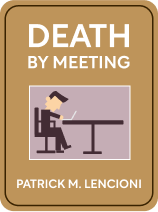

This article is an excerpt from the Shortform book guide to "Death By Meeting" by Patrick M. Lencioni. Shortform has the world's best summaries and analyses of books you should be reading.
Like this article? Sign up for a free trial here .
How bad were Casey’s employee meetings in Death by Meeting? How did Will try to salvage Casey’s meeting format? Was it good enough to impress J.T.?
In Death by Meeting, Yip Software’s CEO Casey is notoriously bad at running employee meetings. His new assistant Will sits in to assess the situation and is shocked by what he sees. If they don’t improve their meetings, Casey could lose his job.
Keep reading to find out why Casey’s employee meetings are so bad and what Will had to say about them.
The CEO’s New Assistant
When Will came into the office, it was clear immediately that he had a magnetic personality. He was gregarious but also seemed kind and curious about the job. Casey knew right away that he would hire him.
Will felt comfortable enough in the interview, especially given that he was overqualified for the position, to ask about Playsoft and the scrutiny that Yip was under. Casey immediately understood that Will’s qualifications and his curiosity would be an asset during a difficult time for the company. So Casey told Will that he could help out with tasks and strategy that aren’t usually part of an administrative assistant’s job.
Unfortunately, Will was not entirely forthcoming about his background. As a child, Will had often blurted out inappropriate and rude remarks to people. This made it difficult for his teachers to like him and got him into scuffles with other kids frequently. He was diagnosed in high school as having a mild case of OCD and Tourette’s Syndrome. He started taking medication and seeing a therapist and his symptoms went away quickly.
However, after leaving grad school, Will decided to stop taking his medication. And his old symptoms came back.
Casey’s Terrible Employee Meetings
Casey decided that he would confide in Will about the full extent of the problems that he was having. Casey believed that J.T. was angling to take his job and told Will. Will decided to do what he could to help Casey keep his job.
Will saw an email from J.T. that laid out the issue—J.T. told Casey that, after attending an employee meeting, he didn’t feel confident in Casey’s capabilities. He was shocked at how harsh this news was and how matter of factly it was delivered via email.
However, once Will got the chance to see an employee meeting in action, he began to understand the problem and the concern from Playsoft. The meeting, scheduled for 10, began at 10:12. No one had reviewed the minutes from last week’s meeting. All of the same problems that had been clear in the previous meeting that J.T. attended were clear in this one as well. They conducted useless arguments, presentations went on for far too long, and by the time they took a quick break with only 30 minutes to go in the 2-hour meeting, it was clear they wouldn’t get to anything of substance from most of the agenda.
After the meeting, as Will headed to lunch with Tim and Casey, Tim asked Will what he thought of the meeting. Will blurted out that it was terrible. He immediately felt bad, but later in the day, Casey told Will he didn’t mind that Will had told the truth. Casey, though, remained convinced that the problems with the meetings that J.T. had referred to in his email were simply a way for J.T. to get in the door, with the ultimate goal of taking Casey’s job. Casey remained fixated on the profits, which he said remained better than those of most of Playsoft’s product lines. Will began to worry that Casey wasn’t understanding the seriousness of the problems with the meetings.
Will Tells It Like It Is
At the next meeting, all of the same problems persisted. But this time, Will couldn’t take it anymore, and he blurted out his concerns to the entire group: They waste time, they don’t talk about anything important, essential people skip them consistently, and they deplete morale. Casey decided to clear the room, and he spoke to Will directly. He let Will know that he knew about his condition from his father. Casey was kind to Will, and when everyone came back, they agreed that he would apologize to the team.
However, when the team came back, people began piping up, one by one, that they agreed with Will. The meetings were awful and draining. They aired their grievances—the meetings were too long, or too boring, or too unfocused—and Casey got a bit defensive, arguing that no one liked the meetings because meetings are inherently boring. While the team felt good having aired some of their problems, they didn’t imagine that anything could change. Each one of them believed that the meetings as Casey constructed them were a necessary evil.
Will Leads a Meeting
Will was not so certain that there was no answer to their problems. While watching a movie over the weekend, Will thought he had found the problem—the length. Great movies can cover huge lengths of time, sometimes years, in less than two hours, so why did a meeting, which had much less temporal ground to cover, have to be as long as a movie?
When Will went into work on Monday, a colleague informed him that J.T. would be at the meeting that day and that Casey had been at the dentist that morning. The dentist gave him novocaine in his mouth, so he couldn’t speak well.
Will took the lead in the meeting. It went more quickly than usual, and people in the room were pleased with it, but J.T. still went to Casey’s office afterward and let him know that he had called the head of Playsoft, Wade, and explained that he thought the meetings were terrible. Wade would be attending a meeting in five weeks, and Wade informed Casey that he still had confidence in him. It was clear, though, that if the meetings weren’t better in five weeks, that confidence could be gone quickly.

———End of Preview———
Like what you just read? Read the rest of the world's best book summary and analysis of Patrick M. Lencioni's "Death By Meeting" at Shortform .
Here's what you'll find in our full Death By Meeting summary :
- Why are meetings so important and detrimental at the same time
- The top 3 issues that commonly plague meetings
- Why a meeting where participants disagree can be a good thing






